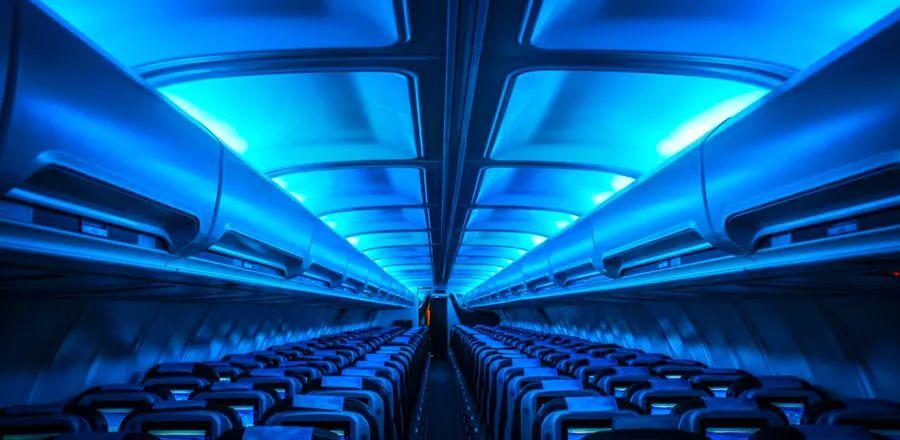Does Lowering the Cabin Lights Truly Aid Travelers in Reducing Jet Lag?

When Etihad introduced its new Airbus A350 in 2022, the airline highlighted various features, including business-class pods with reclining seats, entertainment for kids, and LED cabin lighting designed to mitigate jet lag effects.
In the announcement for the new long-haul aircraft, the airline stated that the lighting aimed to 'mimic natural ambient light' and 'create an ideal sleeping environment.' This meant that, after meal service, crew members gradually dimmed the lights to assist passengers in sleeping, then slowly brightened them to gently wake travelers for another meal before landing. Similarly, when JetBlue launched its revamped Mint service for transatlantic flights, it featured customizable lighting that shifted to a deep blue following in-flight dining to encourage sleep and transitioned to sunrise colors to wake passengers before breakfast.
Traveling long distances across different time zones can be tough for passengers, especially when trying to stick to a regular sleep routine. Therefore, custom lighting to combat jet lag seems like a thoughtful service enhancement. However, Dr. Chelsea Perry, the founder of Sleep Solutions, a sleep medicine clinic in Massachusetts, pointed out that multiple factors influence the best times to sleep during flights to minimize jet lag, such as travel direction, departure and arrival times, and the time zones being crossed. Given this complexity, the universal lighting strategy used by airlines may only benefit certain long-haul journeys.
Nonetheless, there are strategies to leverage the lighting and steps you can take to reduce the effects of jet lag. Here’s what you should consider.
What is jet lag, and what triggers it?
Dr. Catherine Darley, a sleep disorder specialist and founder of skilledsleeper.com, explains that our body's internal clock is intricately linked to our surroundings. Factors like light, darkness, temperature shifts, along with routines such as meal times, activity levels, and social engagements, condition us to be awake during the day and rest at night. Disrupting an established sleep pattern can be quite difficult.
According to Darley, 'Our body clock can adjust by a maximum of one hour per day.' This is why experiencing jet lag feels like battling against our internal clock, which remains aligned with our original location, while we're responding to environmental and behavioral signals at vastly different times in our new setting.
As a result, the Cleveland Clinic, a nonprofit academic medical center, notes that jet lag can leave you feeling 'disoriented due to a sudden shift in your body's internal clock.'

Image courtesy of Shutterstock
When is the science behind cabin-lighting changes most effective?
Dr. Shelby Harris, a licensed clinical psychologist who specializes in behavioral sleep medicine, explains that the dimming strategy is most effective for flights that leave in the evening and continue overnight. This approach can help passengers rest during their natural sleep hours.
According to Harris, 'When flying east, especially on long-haul journeys, travelers 'lose' time and typically arrive in the morning.' Dimming the lights after the first meal can facilitate earlier sleep, making it easier to awaken closer to the local morning time.
On the other hand, if flight crews dim the lights right after the first meal service on morning or afternoon departures, it may disrupt passengers’ sleep cycles.
Travelers flying west typically gain time, which aids them in staying awake longer to acclimate to the new time zone. Harris emphasized, 'Switching off the lights too early could complicate the adjustment to the longer day and delay sleep.'
She mentioned that for flights traversing multiple time zones, a more sophisticated lighting strategy—rather than a straightforward on-off switch after the first meal—could assist passengers in gradually acclimating to their destination's time zone.
Nevertheless, she acknowledged that dimming the lights often fosters a more relaxing atmosphere for passengers.
'While it isn't a comprehensive solution, this method, combined with sleep adjustments before your trip and exposure to sunlight upon arrival, can help align your internal clock with your destination’s time zone,' Harris stated.
How to alleviate jet lag, according to experts
If feasible, Perry suggests gradually adjusting your sleep schedule to align with the new time zone approximately three days prior to your trip.
'For example, if you're traveling to a location that is ahead in time zones, such as New York to London, try going to bed an hour earlier each night,' Perry advised. 'Conversely, for destinations that are behind your current time, like Los Angeles to Tokyo, staying up a bit later can help with the adjustment.'
This timing also influences your in-flight sleep. Harris explains that 'the optimal time to sleep on a long flight varies based on your direction and schedule. If you're flying east, such as from New York to London, aim to sleep early in the flight to coincide with your destination's bedtime. For westward flights, like from London to New York, it’s better to stay awake longer and sleep later in the flight to sync up with local time upon arrival.'
Harris also pointed out the importance of considering your arrival time. If you're landing in the morning or early afternoon, it's beneficial to sleep during the flight to feel more refreshed. If your arrival is in the evening, it's advisable to stay awake on the plane and sleep once you reach your destination.
Perry additionally recommends syncing your in-flight meals with the local time of your destination. Eating at intervals that match your destination's schedule can help signal your body to adjust. Staying hydrated is also vital, as dehydration can intensify jet lag symptoms. She advises avoiding alcohol and caffeine, which can disrupt sleep patterns and complicate the adjustment process. Furthermore, she suggests spending time in natural light upon arrival, as sunlight serves as a powerful cue for regulating your body’s circadian rhythms, making outdoor activity during the day beneficial for adaptation.
'The more you synchronize your activities—such as sleeping, eating, and enjoying the outdoors—with the local time, the faster you'll mitigate the effects of jet lag,' Perry stated.
Evaluation :
5/5



